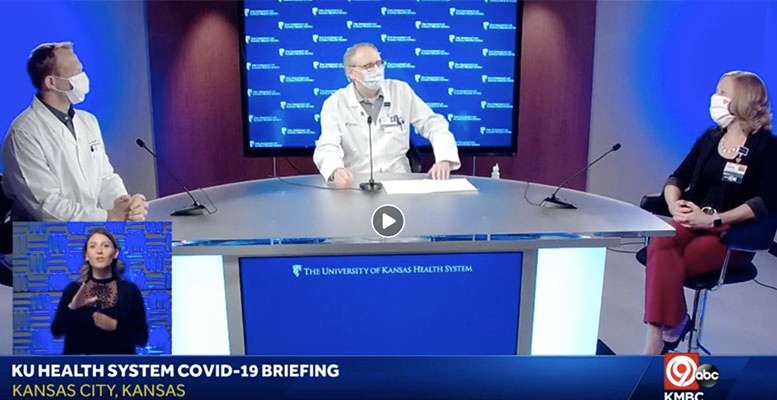
By CRISTINA JANNEY
Hays Post
Is it OK to hug a loved one? Should I sign my child up for sports this summer? Do I need to wear a mask at work?
Health care professionals at the University of Kansas Health System answered these questions and others Monday about staying safe as the Kansas economy begins to reopen after the COVID-19 shutdown.
Dr. Steve Stites, chief medical officer at the health system, was joined by Dr. Dana Hawkinson, medical director of infection prevention and control, and Amanda Gartner, RN, director of Quality and Safety.
"I think at some point we have to realize this is about relative risk and not about absolute safety," Stites said. "Absolute safety is 'Give me the bubble wrap and I'll just stay inside.' ...
"Each person has to determine their own level of risk."
Is there a safe way to hug someone?
"A hug is a very short period of time, and I think there are ways to make it safe," Hawkinson said.
Wearing masks and turning your head from each other can lower the chances of transferring droplets that can spread the virus, the health care workers said.
Is it OK for my kids to play organized sports this summer?
The health care workers discouraged children playing organized sports even though phase two and three of the governor's reopening plan would allow it.
Stites especially discouraged organized sports for young children who might not be able to understand or realistically practice social distancing.
"The problem is not that it is baseball. It is that you just brought a bunch of 5- and 7-year-olds together," he said. "Would you let that happen in another environment?"
The children who contract the virus will likely be asymptomatic. They might not feel sick, but they can spread the virus to others, Stites said.
In baseball or softball, the ball can be a means of transferring the virus. Athletes also sit close to each other when they are on the bench waiting to bat.
Even testing is not insurance, because a negative test today can be a positive test tomorrow, Gartner said.
Should I wear a mask at work?
Gartner said anytime you think or know you are going to be around people, you should wear a mask, including at work.
"I was speaking to someone in an office space earlier today, and I said she should really have a mask on. She said, 'I'm just sitting at my desk.' But people come to her desk often," Gartner said.
Stites recommended wait staff wear masks and gloves when serving food.
What are safe shopping procedures?
Gartner said she keeps hand sanitizer in her car at all times. She also wears a mask when she goes to the grocery store.
"It also helps remind me to not touch my face when I have a mask on," she said. "You come into contact with the environment and then the likelihood of transmission is when you touch your face."
The virus can live on hard or nonporous surfaces such as cans, bottles and chip bags. You can wipe those down when you get home with an alcohol wipe. Fruits and vegetables can by washed with water.
However, if the cans are left to sit for a couple of days, the virus won't last on the items.
He noted there have been no confirmed cases of people being infected from touching grocery items.
Is it possible to over-sanitize? Will this hurt our immune systems?
"I don't think there is a risk of over sanitizing," Gartner said. "I think these are all really good practices despite COVID."
She also said health care workers have known for years good hand hygiene practices help prevent infection.
Hawkinson said the human body is regularly exposed to other pathogens.
Will we still have to wear masks after June 15?
The doctors said just because the economy is opening does not mean that the virus is gone.
Hawkinson said we will still likely see cases.
Stites said effective therapy or a vaccine will likely be anywhere from six to 18 months away.
Gartner said, "I think we have to be very mindful. Some of the regulations have changed and we can go out into the community, but we still have to be very aware of the risk of the spread here."
She said it is still important to maintain small group gatherings, wear a mask in public, clean, and wash your hands.
Stites said, "The rules haven't changed just because the calendar did."
He said we need to take personal responsibility.
"Making other people unhealthy is not going to make the economy better," he said. "What is going to make it better is being here in the long term."
He repeated precautions are about relative risk.
"If you want to use bubble wrap and not go out, you can do that," he said, "but I don't know that is a humanly possible thing. You have to balance the different needs you have as a person against that.
"One the things is when you listen to all public health people is they are going to say you have to do all these things. That's great, but it's not real health. You have to cope with what is real health."
Hawkinson said public health officials try to aim for the gold standard because they know most people will fudge and not quite reach those standards.
Will students be safe in dorms in August?
Hawkinson said we know dorm living has historically been dangerous because people are congregated together. He gave the example of meningitis.
"In a place like a dorm or fraternity or sorority house," he said, "infectious disease can spread very quickly. I think it is too early to say, but right now I would say I probably wouldn't do that, especially if you are expecting to go back and forth every couple of weeks to see your loved ones."






